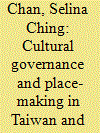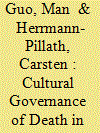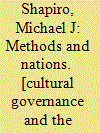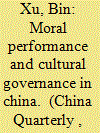|
|
|
Sort Order |
|
|
|
Items / Page
|
|
|
|
|
|
|
| Srl | Item |
| 1 |
ID:
145659


|
|
|
|
|
| Summary/Abstract |
This article examines the Party-State-led Countryside Confucianism experiment based in the rural vicinities of Qufu. There has been, since the 1980s, a renewed interest in Confucianism from both mainland and foreign scholars. More academic to begin with, the focus has recently shifted toward more local and popular groups spreading Confucian teachings across the People’s Republic. This popular resurgence, often described as disjointed and fragmented, has sometimes expressed a more religious or politically charged Confucianism. Recent developments in the Shandong province are now pointing to a more organized—through the involvement of the Party-State—local revival. I argue that this recent government involvement in local Confucian revival comes as a way to compete and reposition itself on the local “cultural market” in order to reinstate its cultural authority over Confucianism, to curb certain practices and possibly restrain the growth of foreign beliefs in the Confucian city of Qufu. This objective of the article is first to document this countryside experience as to frame it in the more general Confucian revival. Furthermore, it will examine its ties to previous rural experiences conducted in Shandong as well as some of its more indirect sociopolitical objectives. To a certain extent, understanding this Party-State-led organized form of local Confucianism will shed light on its renewed role in terms of cultural authority, cultural governance, and local Confucian revival.
|
|
|
|
|
|
|
|
|
|
|
|
|
|
|
|
| 2 |
ID:
105857


|
|
|
|
|
| Publication |
2011.
|
| Summary/Abstract |
This article compares cultural governance in Taiwan and China through their respective place-making processes. It investigates how cultural polices objectify tradition and popularize cultural landscape in local places for economic development and identity politics. Contrary to what would be commonly expected, the Chinese government adopted a minimalist approach while the Taiwanese government was much more hands-on. The sociopolitical histories of the two governments and their objectives are examined to understand this difference. In addition, the reactions of the locals to cultural policies in the two places are also contrasted. Finally, the different effects of cultural governance in China and Taiwan are examined. In particular, it was found that communal relations have deteriorated in China but strengthened in Taiwan as a result.
|
|
|
|
|
|
|
|
|
|
|
|
|
|
|
|
| 3 |
ID:
192183


|
|
|
|
|
| Summary/Abstract |
For decades, funeral reform has been a key concern for cultural governance in China as the state has attempted to manage “feudal” and “superstitious” practices and economize resources such as land devoted to cemeteries. We analyse the status of funeral reforms in Shenzhen, combining general observations with a case study of an urban village. We show how the business of funeral service providers mediates between cultural governance and grassroots-level needs and demands, resulting in distinct forms of ritual hybridization. In the case of native villagers, we observe the bifurcation of rituals at the central municipal parlour and at the home of the deceased. For understanding the adaptability of death rituals under the regime of cultural governance, it is essential to distinguish between funeral rites and their modular structure on the one hand, and rites for the disposal of the body on the other.
|
|
|
|
|
|
|
|
|
|
|
|
|
|
|
|
| 4 |
ID:
051012


|
|
|
|
|
| Publication |
New York, Routledge, 2004.
|
| Description |
xix, 258p.Hbk
|
| Series |
Global Horizons Series
|
| Standard Number |
0415945313
|
|
|
|
|
|
|
|
|
|
|
|
Copies: C:1/I:0,R:0,Q:0
Circulation
| Accession# | Call# | Current Location | Status | Policy | Location |
| 047984 | 700.103/SHA 047984 | Main | On Shelf | General | |
|
|
|
|
| 5 |
ID:
146515


|
|
|
|
|
| Summary/Abstract |
This article examines the Chinese state's moral performance during several major disasters, including the 2008 Sichuan earthquake, the 1998 Yangtze River floods, and the 1976 Tangshan earthquake. Drawing on the theatrical theory of symbolic politics, I argue that the Sichuan earthquake marked a turn in the state's moral performance. While the Chinese state continued to project an image of a secure, heroic state, it endeavoured to construct a sympathetic image through leaders' displays of compassion and sorrow, a mourning ritual for ordinary victims, and narratives of response and rescue. This shift towards a more compassionate performance can be explained by the state's deployment of cultural resources to respond to societal challenges since the new millennium and its effort to repair its image amid the crises of 2008. The compassionate performance was temporarily effective because it found common ground with the traditional political culture of disaster, which still shapes the public's expectations of the state's moral conduct, and the new public culture that values equality and dignity of human life. Nevertheless, the political dilemmas of the compassionate performance became evident. Its efficacy largely relied on the presentation of suffering at the scene, which, however, led to public demands for the state to address the causes of the suffering. When the state failed to construct an “accountable state” image, this “dilemma of scene” had repercussions for its legitimacy. The efficacy of paternalism was also limited because it was less appealing to the growing urban middle class. By addressing moral performance, this paper contributes to the literature on politics of disaster and advances the important research agenda on cultural governance.
|
|
|
|
|
|
|
|
|
|
|
|
|
|
|
|
|
|
|
|
|